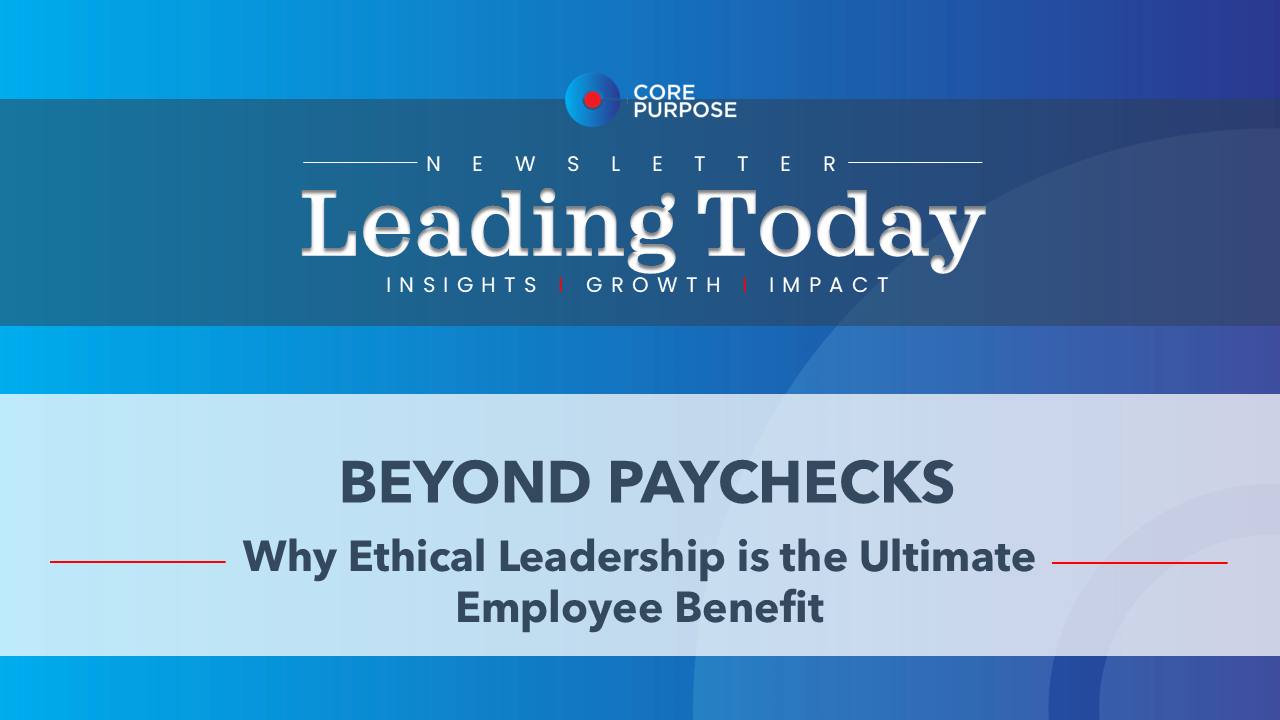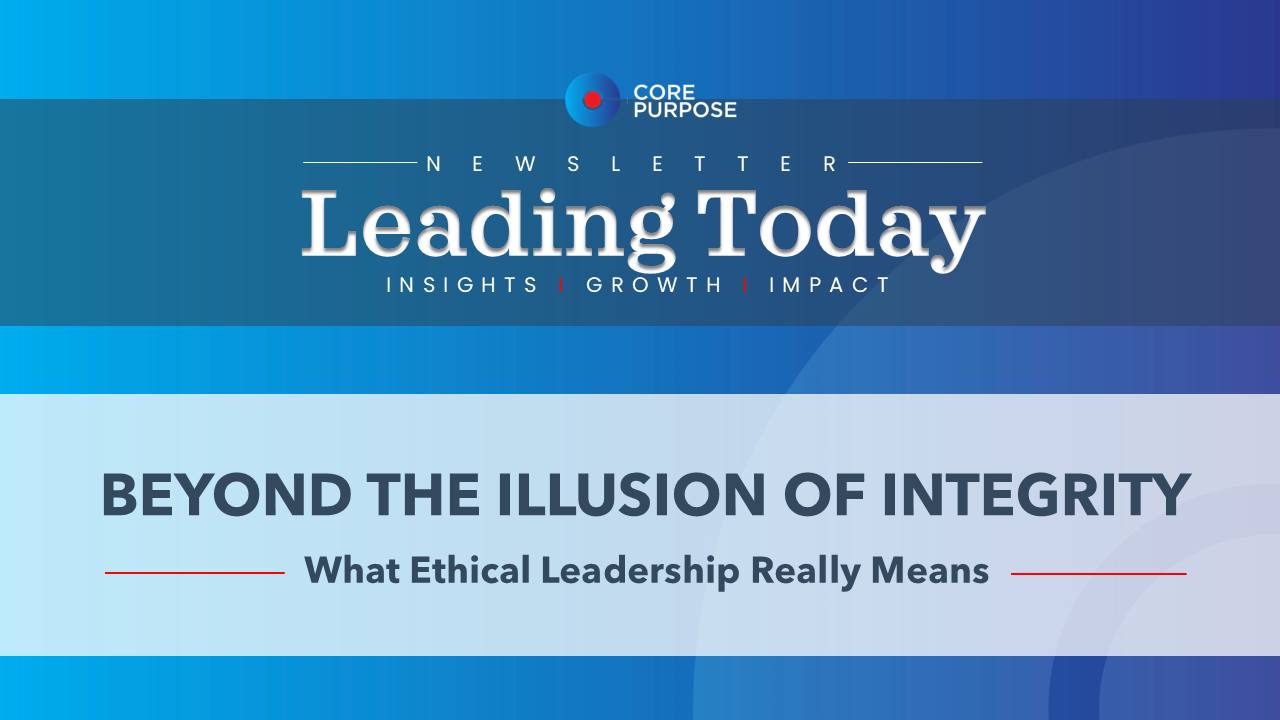Psychological Safety
Building a Workplace of Trust Through Ethical Leadership
In today’s workplaces, innovation and trust thrive in environments where people feel safe to speak up. But too often, employees hold back, fearing judgment or backlash. Without psychological safety, teams become stagnant, disengaged, and unproductive.
A Google study (Project Aristotle) found that teams with high psychological safety are 50% more productive and innovative than those without it. Meanwhile, research from Gallup shows that disengaged employees—often a result of fear-driven workplaces—cost companies an estimated $1.9 trillion per year in lost productivity.
So, the question is: Are you fostering silence, hesitation, and fear—or creating an environment where people feel safe to contribute?
How Lack of Psychological Safety Manifests
Psychological safety isn’t just about speaking up—it’s about how employees engage with their work, their colleagues, and leadership. When employees don’t feel safe, the impact is seen across multiple dimensions:
- Silence and Avoidance: Employees hesitate to share concerns, challenge ideas, or provide feedback.
- Lack of Initiative: Team members avoid taking risks or proposing new ideas, fearing failure or criticism.
- High Stress and Anxiety: Constant fear of making mistakes leads to burnout and disengagement.
- Blame Culture: Instead of addressing problems collaboratively, mistakes are met with punishment or scapegoating.
- In-group vs. Out-group Mentality: Employees feel excluded or hesitant to contribute if they don’t align with dominant workplace dynamics.
- Micromanagement and Control: Leaders who don’t trust their employees create environments where autonomy and creativity are stifled.
Silence Might Be Killing Your Workplace
Fear-driven workplaces can be found in businesses of all sizes, but the way fear manifests differs. In small businesses, employees may hesitate to speak up due to close relationships with leadership or concerns about job security in a smaller team. In large corporations, hierarchical structures and rigid policies can discourage open communication, making employees wary of voicing concerns or challenging the status quo.
In both cases, when employees feel unsafe to express their thoughts, collaboration weakens, innovation slows, and workplace issues go unaddressed. Over time, this leads to disengagement, reduced productivity, and increased turnover.
Understanding Psychological Safety (Beyond Just Speaking Up)
Coined by Harvard professor Amy Edmondson, psychological safety refers to an environment where individuals feel safe to take interpersonal risks without fear of humiliation, rejection, or negative consequences. It allows employees to ask questions, admit mistakes, challenge ideas, and provide candid feedback—all of which are essential for learning and growth.
Psychological safety exists when:
- Employees trust that their opinions will be heard and considered.
- There is room for healthy conflict without fear of retaliation.
- Team members feel comfortable acknowledging uncertainties or asking for help.
- Leaders model openness, humility, and a willingness to learn from others.
Without psychological safety, employees become more concerned with self-preservation than performance, leading to stagnation and fear-based decision-making. In contrast, a psychologically safe workplace fosters high engagement, stronger collaboration, and continuous innovation.
The Ethical Leadership Advantage: Beyond Authority to Integrity
Not all leaders create psychological safety—ethical leaders do. The difference lies in intent and approach. Ethical leadership isn’t just about power or management; it’s about leading with integrity, fairness, and responsibility. Ethical leaders don’t just expect honesty and engagement—they create the conditions for them to thrive.
Here’s how ethical leaders make the difference:
- They Call Out the Fear – Instead of ignoring discomfort, ethical leaders actively acknowledge and dismantle fear-driven behaviors and policies that silence employees.
- They Model Transparency – They don’t just demand openness from their teams; they lead by example, admitting their own mistakes, inviting feedback, and demonstrating that vulnerability is a strength, not a weakness.
- They Hold People Accountable (The Right Way) – Ethical leaders foster a culture where accountability means learning, not blame. Mistakes are opportunities for growth, not punishable offenses.
- They Encourage Pushback – Unlike authoritarian leaders who expect compliance, ethical leaders invite challenge. They recognize that the best ideas often emerge from constructive dissent and ensure that questioning the status quo is not only safe but valued.
While any leader can demand results, ethical leaders create environments where employees feel motivated, secure, and engaged—leading to sustainable success, not just short-term compliance.
Real-World Examples of Psychological Safety in Action
Google’s Project Aristotle: Google conducted a multi-year study on 180 teams and found that psychological safety was the number one factor driving high performance. Teams that felt safe to take risks, speak up, and admit mistakes outperformed others significantly. (Source: Google’s Project Aristotle, re:Work)
A Law Firm That Stopped Losing Talent: A mid-sized law firm was experiencing high turnover due to a cutthroat “win-at-all-costs” culture. Leadership introduced open-door policies, anonymous feedback channels, and leader vulnerability training. Within a year, turnover dropped by 45%. (Source: Harvard Business Review, 'The Fearless Organization')
The Airline Industry’s Approach to Safety: The aviation industry has a robust safety culture where pilots and crew are trained to report errors without fear of punishment. This transparency has led to continuous improvements and prevented countless disasters. (Source: Amy Edmondson, 'The Fearless Organization')
Practical Steps to Foster Psychological Safety Immediately
Psychological safety is not just the responsibility of leaders - everyone in a workplace contributes to creating a culture of trust and openness. Here’s what you can do based on your role:
If you’re in a leadership position:
- Ask Hard Questions: Instead of “Any feedback?”, ask, “What’s one thing I could do better?”
- Stop Shooting Messengers: When employees bring up problems, focus on fixing them—not punishing them.
- Make Speaking Up Normal: Regularly invite disagreement and challenge your own ideas.
- Give Credit Loudly & Criticism Privately: Celebrate contributions openly; correct in a way that builds, not breaks.
If you’re an employee or team member:
- Support Colleagues Who Speak Up: Acknowledge and reinforce open communication when you see it.
- Create a Safe Space in Your Team: Foster open conversations and avoid judgment when coworkers share concerns or ideas.
- Provide Constructive Feedback: Encourage solutions instead of criticism, making it easier for others to engage.
- Lead by Example: Show that it's okay to ask for help, admit mistakes, and contribute ideas without fear.
THE ETHICAL LEADERSHIP BLUEPRINT
The Ethical Leadership Blueprint is designed to equip leaders with the mindset and skills needed to foster psychological safety in their teams. Unlike traditional leadership training, which often focuses on authority and strategy, this programme develops ethical self-leadership, trust-based communication, and conflict resolution—all crucial elements for creating a safe, open workplace where employees feel valued and heard.
Here is how The Ethical Leadership Blueprint directly enhances psychological safety:
1. Ethical Self-Leadership: The Foundation of Psychological Safety
"You cannot lead others until you master yourself."
- Leaders who understand their own emotional triggers and biases are less likely to react defensively or dismissively when employees express concerns.
- The programme enhances emotional intelligence and self-awareness, ensuring that leaders create an environment of non-judgmental listening.
- When leaders model self-regulation and ethical clarity, employees feel safer to engage without fear of erratic reactions.
2. Ethical Communication & Trust: Creating Open Dialogue
"Leadership is influence, and influence is built on trust."
- Psychological safety is built on open, honest, and empathetic communication. This programme trains leaders to:
- Listen actively and without judgment, making employees feel valued.
- Encourage transparency by demonstrating vulnerability—admitting mistakes and learning from them.
- Give constructive feedback in a way that promotes learning rather than fear.
- These skills ensure that employees trust their leaders and feel safe sharing concerns, ideas, and challenges.
3. Ethical Boundaries & Decision-Making: Encouraging Healthy Disagreements
"Saying ‘yes’ to everything leads to burnout. Ethical leaders set boundaries."
- Psychological safety doesn’t mean agreeing on everything—it means fostering respectful debate and principled decision-making.
- This programme helps leaders:
- Set clear expectations so employees understand what is encouraged and what is not.
- Develop ethical reasoning skills so they can navigate difficult decisions fairly.
- Avoid reactionary leadership, which creates confusion and insecurity among employees.
4. Ethical Conflict Resolution & Mediation: Turning Disagreements into Opportunities
"Leadership is tested in moments of conflict. Ethical leaders turn challenges into opportunities."
- Fear of conflict often silences employees. This programme teaches leaders how to:
- De-escalate tensions through ethical mediation techniques.
- Handle difficult conversations with fairness and clarity, ensuring employees feel safe even when conflicts arise.
- Replace blame culture with a solutions-focused approach, reinforcing that mistakes are learning moments, not punishable offenses.
Why This Matters
When leaders lead ethically, they cultivate psychological safety by creating workplaces where:
· Employees trust leadership and feel respected.
· Teams speak openly without fear of backlash.
· Mistakes are viewed as learning opportunities rather than failures.
· Honest feedback leads to growth and innovation rather than disengagement.
Are you ready to create a culture where employees feel safe, engaged, and empowered?
Discover how The Ethical Leadership Blueprint helps leaders build psychologically safe environments that drive results.
What’s Your Next Step?
Psychological safety isn’t just a nice-to-have—it’s a business imperative. If your workplace is suffering from disengagement, high turnover, or a lack of innovation, it’s time to take action.
What’s one step you can take today to foster psychological safety in your team?
If you’re ready to create lasting change, explore The Ethical Leadership Blueprint—your step-by-step guide to transforming workplace culture through ethical leadership.
Discover The Ethical Leadership Blueprint Coaching Programme and start transforming your leadership approach today.
The Ethical Leadership Blueprint™ Group Coaching Programme
Until next time,
The 'Leading Today' Newsletter team at Core Purpose.







Responses